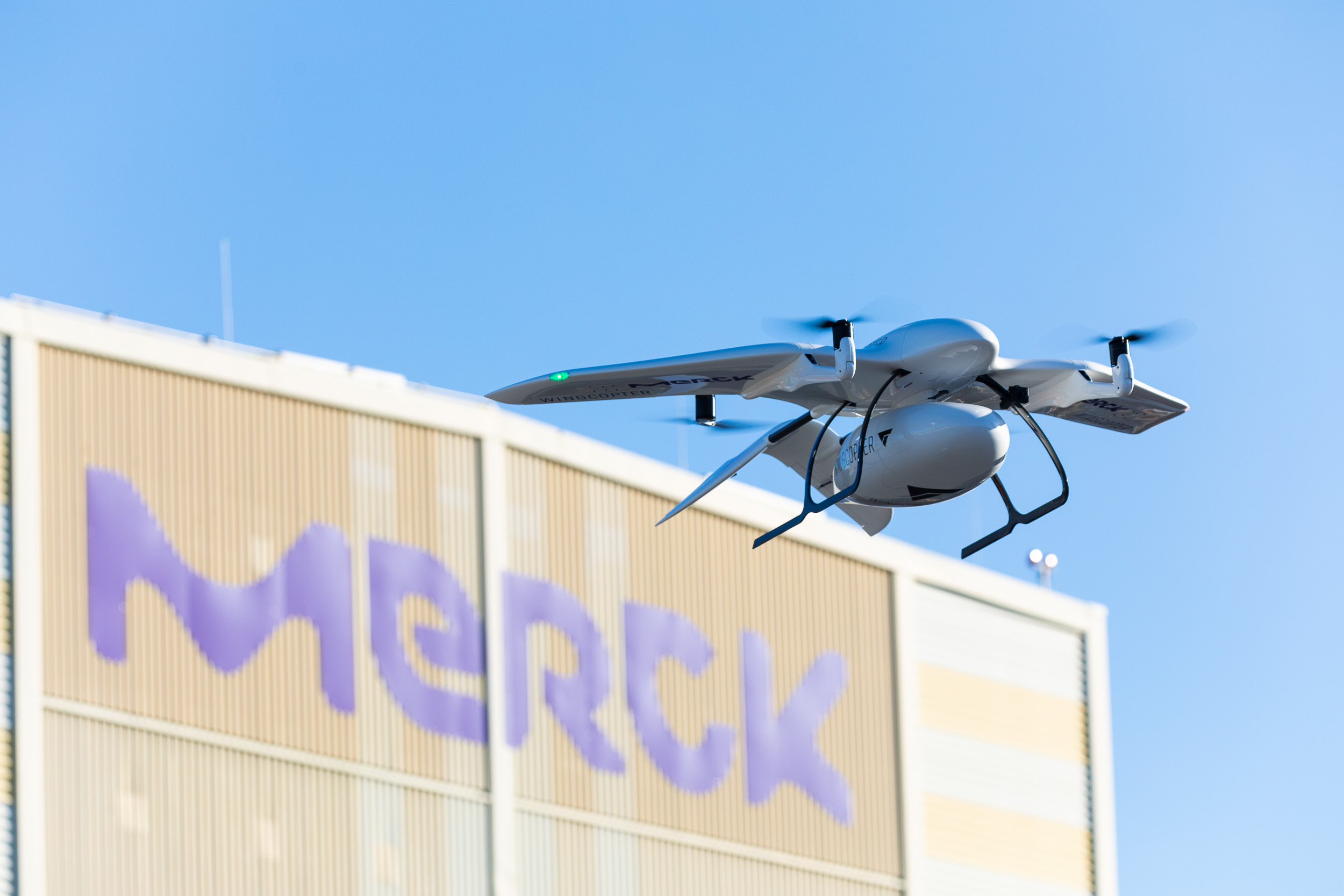
Frankfurt University of Applied Sciences (Frankfurt UAS), Merck and drone manufacturer Wingcopter are designing and testing the use of delivery drones for inter-site logistics operations at Merck. The project, which is the first of its kind in Germany, involves transporting pigment samples by special drone from the Merck site in Gernsheim to a laboratory at Merck headquarters in Darmstadt some 25 kilometers away where they must undergo quality assurance testing for an ongoing production process. A van that travels to and from both sites twice every working day usually handles the transport. The first official flight by drone took place on 5 February.
According to a press release:
“The main objective of the project, known as “ProGeDa: Gernsheim–Darmstadt Sample Shipment,” is to evaluate this shipment solution for inter-site use and develop it into a long-term business model, based on factors such as time savings, sustainability, cost, and flexibility. The Research Lab for Urban Transport (ReLUT) headed by Professor Dr. Kai-Oliver Schocke at Frankfurt UAS is in charge of project management and assessment and is evaluating it with support from Keimer Aviation. The activities of ReLUT center on the development of economic and ecological solutions for delivery and freight forwarding services. Besides developing the special drone, the startup Wingcopter plans and carries out flight operations and coordinates all the aviation law issues involved. Merck is steering the overall process and manufactures the goods for shipment. The German Federal Ministry of Transport and Digital Infrastructure (BMVI) is providing the current project with financial assistance of EUR107,000 from the “mFUND” to support digital business ideas. Wingcopter and the Frankfurt UAS are receiving this funding. Wingcopter was selected for the project since its drones have all the qualities needed for air freight transport between two or more facilities: They can take off and land vertically on the smallest of spaces, but thanks to their swivel-rotor mechanism they can also cover longer distances much more efficiently, quickly and quietly than conventional multicopters.
“A key focus of the project is to determine the best route between the two sites, taking into account a multitude of different factors such as aviation law, environmental impact, suitable takeoff and landing areas, processes on the ground, and costs. The three cooperation partners expect the drone shipment option to prove to be not only faster and more sustainable, but also less expensive and more flexible. “This project will demonstrate the sustainability of drone flights for commercial purposes in public airspace in all three dimensions of sustainable development: environmental, economic and social. We expect a high level of scalability and transferability to other industries,” Professor Dr. Kai-Oliver Schocke says.
Tom Plümmer, CEO of Wingcopter adds: “We have repeatedly demonstrated that our delivery drones offer significant advantages over both conventional, ground-based shipment technologies and manned aircraft in a wide variety of cases, specifically involving life-saving deliveries to remote locations of various developing countries. Thanks to this unique project, we can demonstrate that the benefits are equally applicable to commercial deliveries in urban area of industrialized countries.”
Stefan Nowak, Wingcopter project manager, points out: “We know of no other project in the world where goods are delivered over such a distance and out of sight by drone in a metropolitan region – across electricity and train routes, motorways and state roads as well as production infrastructure. With today’s flight, the project marks a milestone in the history of unmanned aviation and intermodal logistics.” Moreover, the project serves as a role model for similar projects throughout the world in terms of the aviation regulatory affairs and coordination effort involved.
Jens Klatyk, Gernsheim Site Director, sees other benefits of the project: “The analytical laboratories in Gernsheim do not cover all the required parameters, which is why special laboratory tests are performed at the Darmstadt site. Using drones instead of motor vehicles to transport the samples offers the possibility to speed up delivery and avoid traffic congestion.” The associated time savings can range from one hour to one day. Drone delivery also helps to avoid empty miles and emissions.
Based on the data obtained during the delivery flights and investigation of the end-to-end processes, the project partners will present their final report in March upon completion of the project phase. The report will show under which circumstances the use of drones in site logistics can be economically and ecologically sustainable. Guidelines, possible additional use cases and operating concepts will be developed on that basis.
Prior to the launch of the project, Wingcopter, a startup, was already part of the StartUp program of the House of Logistics and Mobility (HOLM) at Frankfurt Airport as well as part of the Accelerator program at the Merck Innovation Center The team was busy working at the time in the Innovation Center Maker Space on perfecting its vertical take-off and landing (VTOL) drone, using the facilities of the Rapid Prototyping Lab. In the course of continuous communication with in-house staff, the idea for the ProGeDa project emerged and was subsequently supported and encouraged by the Merck Accelerator and Innovation Center. The project is a good example of the diversity of collaborative ventures that startups can initiate in the Merck Accelerator program.
For more information
www.frankfurt-university.de/relut

